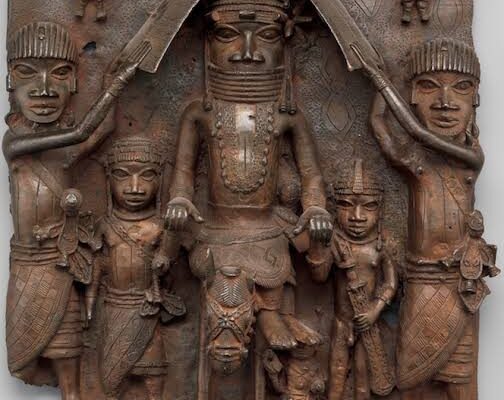The historical kingdom of Benin, established in the forested region of West Africa in the 1200s C.E., was founded by the Edo people of southern Nigeria.
Seeking independence from the rule of their kings, known as the ogisos, the Edo people asked a prince from Ife, an important West African kingdom, to take control.
This led to the establishment of the kingdom and the ascension of the first oba, Eweka, who was the son of the prince from Ife.
Reign of Oba Ewuare the Great
Under the reign of Oba Ewuare the Great, Benin reached its pinnacle of power and size. The kingdom expanded, and the capital, present-day Benin City, was enhanced with massive walls.
This period marked the height of power for Benin’s monarchs, accompanied by rituals expressing the people’s devotion and loyalty, including human sacrifices.
Artists of the Benin Kingdom were renowned for their craftsmanship in various materials, particularly brass, wood, and ivory. Their bas-relief sculptures, especially plaques, and life-size head sculptures were highly esteemed.
Flourishing trade and involvement in the slave trade
Benin’s success was fueled by its lively trade, particularly with the Portuguese, who sought after the kingdom’s artwork, gold, ivory, and pepper.
However, Benin’s involvement in the West African slave trade also played a significant role in its wealth.
The kingdom would capture men, women, and children from rival peoples and sell them into slavery to European and American buyers, providing a significant source of wealth for the kingdom.
Internal strife and civil wars
The 1800s brought internal strife to Benin as royal family members vied for power, leading to civil wars that weakened the kingdom.
This vulnerability made it difficult for Benin to resist foreign interference, particularly by the British, who ultimately invaded Benin in 1897. The city was burned, and Benin became part of British Nigeria.
Legacy of the Oba of Benin
Despite these tumultuous events, the oba still serves as a government advisor in Benin City today. The lineage of the obas has persisted through the centuries, with each ruler leaving a unique mark on the kingdom’s history.
From the early rulers like Ewuare the Great to the tragic fate of Ovonramwen, the Oba of Benin, the kingdom’s story is one of power, art, and conflict, shaping the cultural and historical landscape of modern-day Nigeria.








